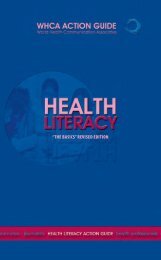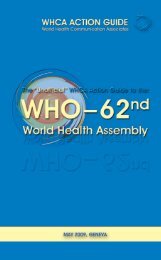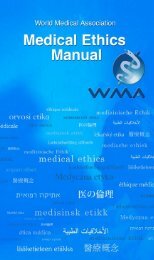Part 1 'the basics' - World Health Communication Associates
Part 1 'the basics' - World Health Communication Associates
Part 1 'the basics' - World Health Communication Associates
Create successful ePaper yourself
Turn your PDF publications into a flip-book with our unique Google optimized e-Paper software.
The WHO and several international health professional associations have called<br />
for major changes in health workforce training to develop the provider skills required<br />
to meet the health literacy and other needs created by the prevalence of chronic<br />
illness. Skills called for include the ability of providers to support self-managed care,<br />
build more partnership-based provider–patient relationships, and communicate<br />
more effectively (Pruitt and Epping-Jordan 2005).<br />
self management<br />
In the past, patient health management was primarily the responsibility of the<br />
physician. However, in many health systems people are increasingly encouraged to<br />
take more responsibility for their own health. To make appropriate self-management<br />
decisions, people must locate health information, evaluate the information for<br />
credibility and quality, and analyse risks and benefits. Furthermore, people must<br />
be able to ask pertinent questions and express health concerns clearly by describing<br />
symptoms in ways the providers can understand (IOM 2004, p168).<br />
<strong>Health</strong> care providers need to take ‘universal precautions’ in relation to health literacy and<br />
assume that everyone may have trouble understanding health information. They should take<br />
steps to strengthen their own and their institutions’ communications.<br />
Section 4: wHat can we do to StrenGtHen HealtH literacy? 27<br />
© Photo by Kara Jacobson






